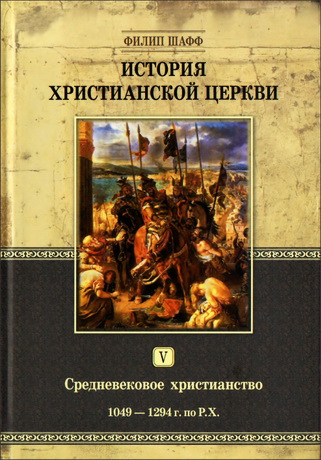
Cambridge Companions - Historical Events and Places
A little over an hour into Ron Howard’s cinematic adaptation of The Da Vinci Code, for the first time in a major Hollywood film we see a portrayal of the Council of Nicaea. The brief scene takes place in an expansive, ornately decorated basilica, ending in an apse whose vault is decorated with an anachronistic image of an enthroned Christ, who presides over the proceedings (figure 1.1).
The great hall is filled with scribes sitting at a long table and taking notes, as a motley crew of attendants, clerics, and bishops, garbed in decorative robes and capped with lofty miters, gesture wildly at one another, yelling across the aisle and apparently debating the particulars of the future of Christianity. As the camera pans across the basilica to the center of the nave, we see Roman soldiers, equipped with spears, shields, and helmets with fancy feather plumes and stationed on elevated platforms along the colonnades of the venue, ominously standing guard over the proceedings. It appears (as far as I can tell) that Constantine is standing in the center of the basilica, next to the notary’s table, somewhat bewildered at the ferocity of the debate surrounding him.
The Cambridge Companion to the Council of Nicaea
Edited by Young Richard Kim, 2021
- 1 – Introduction. Young Richard Kim
Part I - Contexts
- 2 - Imperial Fathers and Their Sons: Licinius, Constantine, and the Council of Nicaea. Raymond Van Dam
- 3 - Arius and Arianism: The Origins of the Alexandrian Controversy. Rebecca Lyman
Part II - The Council
- 4 - Hosting the Council in Nicaea: Material Needs and Solutions. Ine Jacobs
- 5 - Reconstructing the Council of Nicaea. David M. Gwynn
- 6 - The Elephant in the Room: Constantine at the Council. H. A. Drake
Part III - Outcomes
- 7 - The Creed. Mark J. Edwards
- 8 - The Twenty Canons of the Council of Nicaea. Andreas Weckwerth
- 9 - The Council of Nicaea and the Celebration of the Christian Pasch. Daniel P. McCARTHY
- 10 - Narrating the Council: Eusebius on Nicaea. Aaron P. Johnson
Part IV - The Aftermath
- 11 - The Reception of Nicaea and Homoousios to 360. Sara Parvis
- 12 - The Emergence of the Pro-Nicene Alliance. Mark DelCogliano
- 13 - Apollinarius and the Nicene Homoousion. Kelley McCarthy Spoerl
- 14 - The Council of Ariminum (359) and the Rise of the Neo-Nicenes. D. H. Williams
Part V - The Long Reception
- 15 - The Legacy of the Council of Nicaea in the Orthodox Tradition: The Principle of Unchangeability and the Hermeneutic of Continuity. Paul L. Gavrilyuk
- 16 - Catholic Reception of the Council of Nicaea. Geoffrey D. Dunn
Appendix 1: - The Signatories
Appendix 2: - Letter of the Synod of Nicaea to the Egyptians
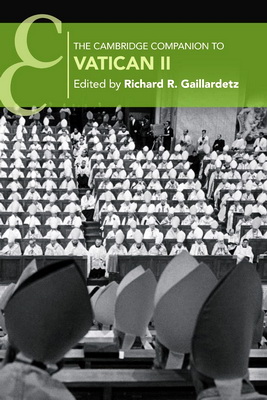
The Cambridge Companion to Vatican II
Edited by Richard R. Gaillardetz, 2020
Preface. RICHARD R. GAILLARDETZ
Part I. Vatican II in Context
- 1. Church Life in the First Half of the Twentieth Century. MARK R. FRANCIS
- 2. Theological Renewal in the First Half of the Twentieth Century. GABRIEL FLYNN
- 3. Papal Leadership in the First Half of the Twentieth Century: Resistance and Renewal. KARIM SCHELKENS
- 4. The Council as Ecclesial Process. MASSIMO FAGGIOLI
- 5. The Role of Non-Voting Participants in the Preparation and Conduct of the Council. PETER DE MEY
- 6. Conciliar Hermeneutics. ORMOND RUSH
Part II. Conciliar Themes and Reception
- 7. The Pilgrim Church: An Ongoing Journey of Ecclesial Renewal and Reform. GERARD MANNION
- 8. The Church in Mission. STEPHEN BEVANS
- 9. Revelation. RICHARD R. GAILLARDETZ
- 10. Liturgy. DAVID FARINA TURNBLOOM
- 11. The Word and Spirit Co-instituting the Church. BRIAN FLANAGAN
- 12. The Christian Faithful. AMANDA C. OSHEIM
- 13. Leadership and Governance in the Church. THOMAS P. RAUSCH
- 14. Ministry in the Church. RICHARD LENNAN
- 15. Professed Religious Life. GEMMA SIMMONDS
- 16. Ecumenism. SUSAN K. WOOD
- 17. The Church and Other Religions. EDMUND KEE-FOOK CHIA
- 18. The Renewal of Moral Theology. JAMES KEENAN
Appendix: Sources for the Study of Vatican II. CATHERINE CLIFFORD
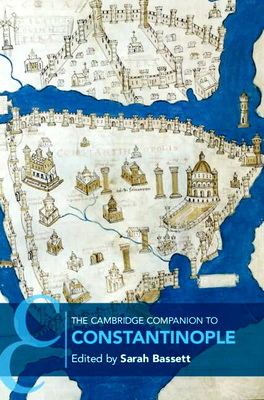
The Cambridge Companion to Constantinople
Edited by SARAH BASSETT, 2022
Introduction. SARAH BASSETT
Part I. The Place and Its People
- 1. Before Constantinople. THOMAS RUSSELL
- 2. Urban Development and Decline, Fourth–Fifteenth Centuries. ALBRECHT BERGER
- 3. The People of Constantinople. ANTHONY KALDELLIS
Part II. Practical Matters
- 4. Waters for a Capital: Hydraulic Infrastructure and Use in Byzantine Constantinople. JAMES CROW
- 5. The Supply of Food to Constantinople. RAYMOND VAN DAM
- 6. Constantinople: Building and Maintenance. ENRICO ZANINI
- 7. The Defence of Constantinople. ERIC MCGEER
Part III. Urban Experiences
- 8. Imperial Constantinople. PAUL MAGDALINO
- 9. Residential Constantinople. ALBRECHT BERGER AND PHILIPP NIEWÖHNER
- 10. Commercial Constantinople. KORAY DURAK
- 11. Sacred Dimensions: Church Building and Ecclesiastical Practice. VASILEIOS MARINIS
- 12. Sacred Dimensions: Constantinopolitan Monasticism. DIRK KRAUSMÜLLER
- 13. Sacred Dimensions: Death and Burial. MARK J. JOHNSON
Part IV. Institutions and Activities
- 14. The Administration of Constantinople. ANDREAS GKOUTZIOUKOSTAS
- 15. Philanthropic Institutions. TIMOTHY S. MILLER
- 16. Schools and Learning. NIELS GAUL
- 17. Entertainment. MARCUS RAUTMAN
Part V. Encountering Constantinople
- 18. Medieval Travellers to Constantinople: Wonders and Wonder. NIKE KOUTRAKOU
- 19. Pilgrimage to Constantinople. ANNEMARIE WEYL CARR
- 20. Encountering and Inventing Constantinople in Early Modern Europe. SEAN ROBERTS
- 21. Byzantium in Early Modern Istanbul. ÇIĞDEM KAFESCIOĞLU
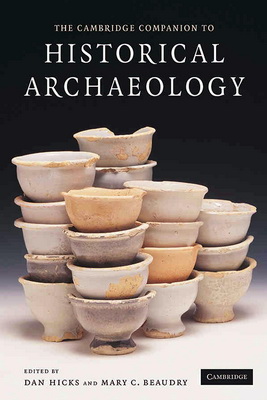
The Cambridge Companion to Historical Archeology
Edited by Dan Hicks and Mary C. Beaudry, 2010
- 1 - Introduction: the place of historical archaeology. Dan Hicks, Stoke-on-Trent City Council, Mary C. Beaudry, Boston University
PART I - ARCHAEOLOGY AND HISTORY
- 2 - Documentary archaeology. Laurie A. Wilkie, University of California, Berkeley
- 3 - Historical archaeology and time. Gavin Lucas, Institute of Archaeology, Reykjavik
- 4 - Writing historical archaeology. Rosemary Joyce, University of California, Berkeley
PART II - KEY THEMES IN HISTORICAL ARCHAEOLOGY
- 5 - Historical archaeology and colonialism. Susan Lawrence, La Trobe University, Melbourne, Nick Shepherd, University of Cape Town
- 6 - Urban historical archaeology. Tadhg O'Keeffe, University College, Dublin, Rebecca Yamin, John Milner Associates, Philadelphia
- 7 - Archaeology, heritage and the recent and contemporary past. John Schofield, University of Bristol, William Gray Johnson, Desert Research Institute, California
- 8 - Marxism and capitalism in historical archaeology. Randall McGuire, Binghamton University, New York
- 9 - Historical archaeology and industrialization. James Symonds, University of Sheffield, Eleanor C. Casella, University of Manchester
- 10 - Historical maritime archaeology. Joe Flatman, University College, London, Mark Staniforth, Flinders University, Adelaide
PART III - HISTORICAL ARCHAEOLOGY AND MATERIAL CULTURE
- 11 - Material culture studies and historical archaeology. Matthew D. Cochran, University College, London, Mary C. Beaudry, Boston University
- 12 - Ceramic studies in historical archaeology. David Barker, Stoke-on-Trent City Council, Teresita Majewski, Statistical Research, Inc., Tucson, Arizona
PART IV - HISTORICAL ARCHAEOLOGY AND LANDSCAPES
- 13 - Landscapes and memories. Cornelius Holtorf, University of Lund, Sweden, Howard Williams, University of Exeter
- 14 - Landscapes, ideology and experience in historical archaeology. Lu Ann De Cunzo, University of Delaware, Julie H. Ernstein, Northwestern State University, Louisiana
PART V - HISTORICAL ARCHAEOLOGY AND BUILDINGS
- 15 - Historical archaeology and buildings. Dan Hicks, Boston University, Audrey Horning, University of Leicester
- 16 - Household archaeology, identities and biographies. Julia A. King, St Mary's College of Maryland
- 17 - Afterword: historical archaeology in the wider discipline. Barry Cunliffe, University of Oxford

The Cambridge Companion to the Literature of the Crusades
Edited by Anthony Bale, 2018
- Introduction. Anthony Bale
Part I - Genres
- 1 - Crusader Chronicles. Elizabeth Lapina
- 2 – The Chanson de geste. Marianne Ailes
- 3 - The Troubadours and Their Lyrics. Linda Paterson
Part II - Contexts and Communities
- 4 - Rome, Byzantium, and the Idea of Holy War. Connor Wilson
- 5 - Women’s Writing and Cultural Patronage. Helen J. Nicholson
- 6 - Reading and Writing in Outremer. Anthony Bale
- 7 - Hebrew Crusade Literature in Its Latin and Arabic Contexts. Uri Zvi Shachar
Part III - Themes and Images
- 8 - The Earthly and Heavenly Jerusalem. Suzanne M. Yeager
- 9 - Orientalism and the ‘Saracen’. Lynn Ramey
- 10 - Chivalry, Masculinity, and Sexuality. Matthew M. Mesley
Part IV - Heroes
- 11 - Saladin and Richard I. Christine Chism
- 12 - ‘El Cid’ (Rodrigo Díaz de Vivar). Julian Weiss
- 13 - Charlemagne, Godfrey of Bouillon, and Louis IX of France. Anne Latowsky
Part V – Afterlives.
- 14 - Romance and Crusade in Late Medieval England. Robert Rouse
- 15 - Renaissance Crusading Literature: Memory, Translation, and Adaptation. Lee Manion
- 16 - The Crusades and Medievalism. Louise D’Arcens
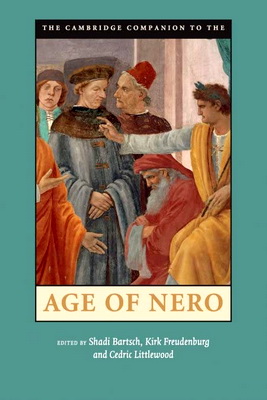
The Cambridge Companion to the Age of Nero
Edited by Shadi Bartsch, Kirk Freudenburg, Cedric Littlewood, 2017
- Introduction: Angles on an Emperor. Shadi Bartsch, Kirk Freudenburg, Cedric Littlewood
Part I - Nero’s World
- 1 - Nero the Performer. Matthew Leigh
- 2 - Nero and the Senate. Josiah Osgood
- 3 - Nero’s Imperial Administration. Carlos F. Noreña
- 4 - Nero’s Women. Anthony A. Barrett
Part II - Neronian Literature
- 5 - Post-Augustan Revisionism. Cedric Littlewood
- 6 - Lucan’s <span class='italic'>Civil War</span> in Nero’s Rome. Gareth Williams
- 7 - Petronius, Realism, Nero. Kirk Freudenburg
- 8 - “Ain’t Sayin’”: Persius in Neroland. Daniel Hooley
Part III - Neronian Seneca
- 9 - Senecan Drama and the Age of Nero. Chiara Torre
- 10 - Philosophers and the State under Nero. Shadi Bartsch
- 11 - Seneca and the Quest for Glory in Nero’s Golden Age. Catharine Edwards
Part IV - Nero’s Monumental Rome
- 12 - Art and the Decadent City. Caroline Vout
- 13 - Staging Nero: Public Imagery and the Domus Aurea. Eugenio La Rocca
- 14 - Burning Rome, Burning Christians. John Pollini
- 15 - Nero’s Memory in Flavian Rome. Eric Varner
Part V - The Neros of Reception
- 16 - Nero: The Making of the Historical Narrative. Donatien Grau
- 17 - Saint Paul and the Christian Communities of Nero’s Rome. J. Albert Harrill
- 18 - The Image of Nero in Renaissance Political Thought. Peter Stacey
- 19 - Resurgences of Nero in the Enlightenment. Elena Russo
- 20 - Nero in Hollywood. Martin M. Winkler
Part VI - After the Last Laugh
- 21 - The Neronian “Symptom”. Erik Gunderson


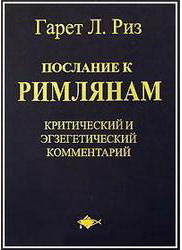
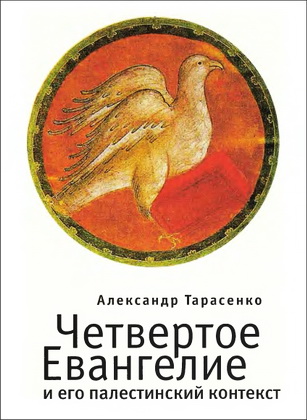
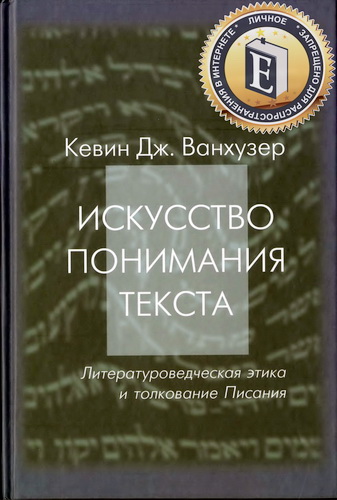
Комментарии
Пока нет комментариев. Будьте первым!